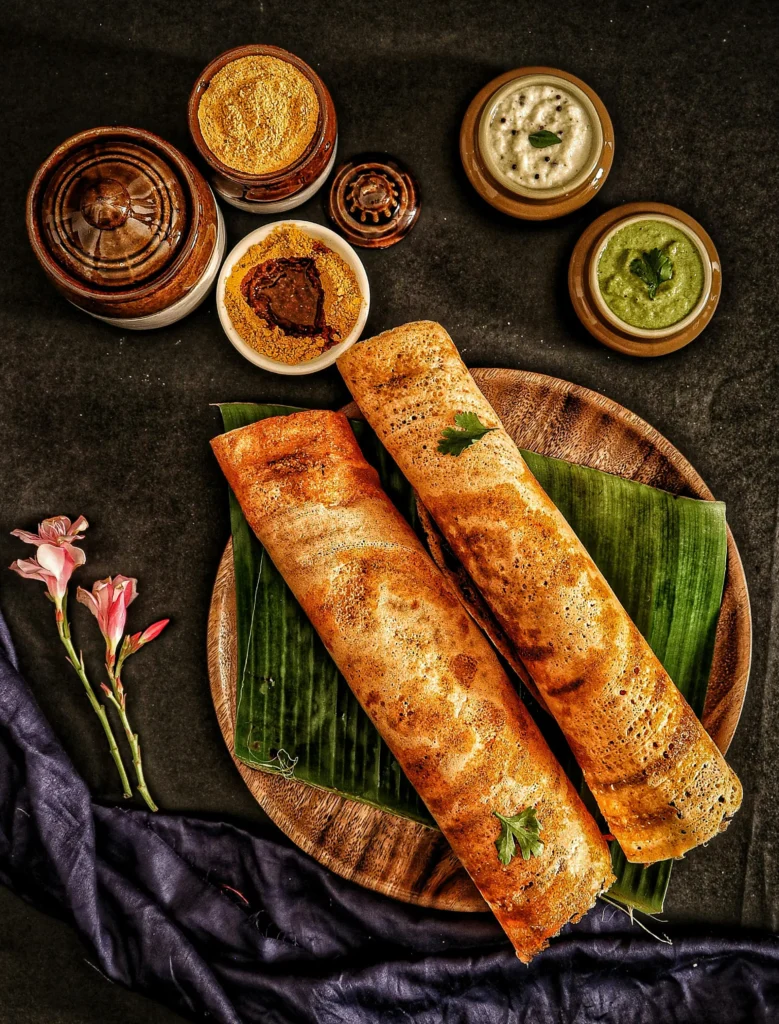Masala Dosa Recipe – a South Indian classic – is one of the most revered gastronomic creations that represent the vividly spiced treasury with the excellence of the region. Its allure lies in the delicate balance of textures and tastes: the crunchiness of dosa, the potato filling bursting with spicy masala, and chutneys adding that delicious sour taste to the meal. To begin, let’s turn to a collage of wonderful flavors that embody those of the traditional recipe!
The Essence of Masala Dosa

Dosa is perhaps the most heartening item in the masala dosa recipe – a golden crepe paratha attained from the fermented batter of combined rice and lentil. As the dough rests and ferments for many hours, it transforms into a medium that becomes the playground for the rich assortment of flavors that characterize the resulting culinary delight. The dosa, made perfectly on a heated griddle, representing the balance between crisp edges and soft parts, is one of the most delicious foods in the world; it is so soft that your teeth bite into it to your satisfaction with each bite.
Crafting the Perfect Potato Masala Dosa Recipe

Getting starch out would leave nothing, and the closest thing to a proper southern masala dosa is the trusty potato masala. Chewy and tender boiled potatoes blend into copious spices and glorious aromatic flavors. The distinctive sizzle of mustard seeds popping in hot oil wafts with the delightful blend, while curry leaves lend their unique aroma to the preparation. Turmeric imparts a golden tinge to the preparation. It is the special element that makes the dish look so colorful. Consequently, this particularity of cover won’t surely be enough to attract and satisfy your client in the long run.
Nutritional Profile of Masala Dosa
Its essence is not just that, the Masala dosa recipe of masala has a nutritional nature which in line with modern dietary preferences. It has no cholesterol and is low in fats. Therefore, this can be a minimal intake for people who care about their bodies. The dosa batter prepared from a combination of rice and lentils ensures that the dish serves up as a surrogate of both complex carbohydrates as well as protein. The nutritious potato and protein-rich potato masala dish makes this dish appealing because it contains perfect increments of each type of macronutrient, whatever time of the day you want to eat.
Culinary Artistry in Action
Making the best masala dosa recipe is not just about having the greatest cooking ability; it entails a lot of desire, integrity, and a high level of respect for a practice that has been alive for years. Not just starting with soaking the rice and lentils, but even fermenting the batter overnight each way of preparation displays the degree of passionate feelings, the dish goes beyond the ordinary nutrition. Every single dosa imperceptibly dolloped onto a sizzling pan, testifies to the cooking artistry, which has always been the prized possession of our homestead.
Serving Suggestions and Culinary Creativity

Remaining faithful to the authentic masala dosa recipe is paramount, but notwithstanding that, the burst of creativity in the kitchen is unlimited. Each has its distinct style of filling a ravioli with a different kind of filling, making this dish even more popular when trying out exotic recipes. From the elegant Turkish filling to the flamboyant turnover batter, the creativity is as limitless as the individual’s capability. The original masala dosa recipe dish is not complete without spicy coconut chutney or spicy sambar as the accompaniments but the same serves as an inspiration for even more innovative companion creations.
Best Masala Dosa Recipe: Crispy, Flavorful, and Satisfying
Description
Masala Dosa Recipe is a popular South Indian delicacy consisting of a thin, crispy crepe made from fermented rice and lentil batter, filled with a flavorful potato masala stuffing. This dish is enjoyed as a breakfast item or as a satisfying meal any time of the day.
Ingredients
For Dosa Batter:
For Potato Masala:
For Dosa:
Instructions
-
Prepare Dosa Batter:
- Rinse the raw rice and urad dal separately under running water.
- Soak them in water for 4-6 hours.
- Drain the water and grind the rice and dal separately to a smooth paste using a little water. The batter should be of pouring consistency.
- Mix the rice and dal batter together in a large bowl, add salt, and combine well.
- Cover the bowl and let it ferment overnight or for at least 8 hours in a warm place.
-
Make Potato Masala:
- Heat oil in a pan and add mustard seeds. Let them splutter.
- Add cumin seeds, asafoetida, and curry leaves. Sauté for a few seconds.
- Add chopped onions and green chilies. Cook until onions turn translucent.
- Add turmeric powder and mix well.
- Add mashed potatoes and salt. Mix everything thoroughly and cook for 2-3 minutes.
- Remove from heat and set aside.
-
Cook Dosa:
- Heat a non-stick dosa pan or griddle over medium heat.
- Once hot, pour a ladleful of dosa batter onto the center of the pan.
- Using the back of the ladle, spread the batter in a circular motion to form a thin layer.
- Drizzle some oil around the edges of the dosa and cook until the edges start to lift and the bottom turns golden brown.
- Spoon a portion of potato masala onto one half of the dosa.
- Fold the dosa over the filling to form a semi-circle.
- Cook for another minute until the dosa turns crispy and golden brown.
- Remove from the pan and serve hot with coconut chutney and sambar.
Servings 12
- Amount Per Serving
- Calories 120kcal
- % Daily Value *
- Total Fat 1g2%
- Saturated Fat 1g5%
- Sodium 170mg8%
- Potassium 110mg4%
- Total Carbohydrate 23g8%
- Dietary Fiber 3g12%
- Sugars 1g
- Protein 4g8%
- Vitamin A 18 IU
- Vitamin C 5 mg
- Calcium 14 mg
- Iron 2 mg
* Percent Daily Values are based on a 2,000 calorie diet. Your daily value may be higher or lower depending on your calorie needs.
Note
- You can adjust the spiciness of the potato masala by adding more or fewer green chilies according to your preference.
- Fermenting the dosa batter is crucial for achieving the right texture and taste. Allow it to ferment overnight or for at least 8 hours in a warm place.




